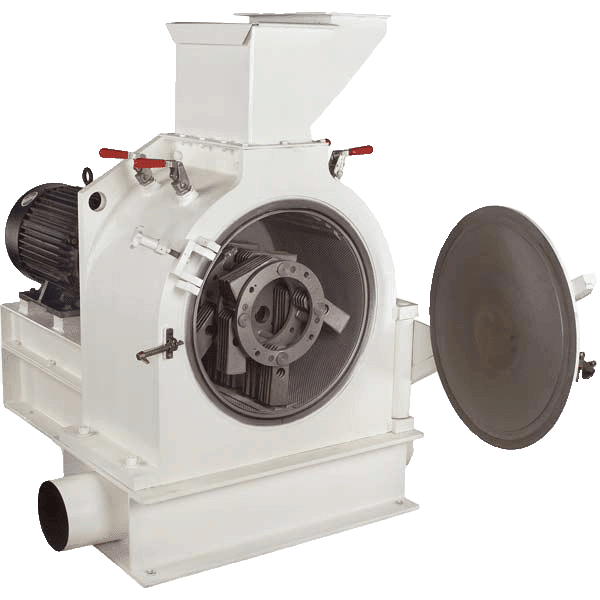Distillery Mills
Roller or Hammer, Sometimes Both
The type of mill used will affect the consistency of the mash, the efficiency of fermentation, and ultimately, the flavor profile of the final product. Here we’ll cover the options we have and the benefits of each. Generally roller mills are ideal if you have enough rollers, surface area, and you swap the motors, and hammer mills are used when you really need that throughput. Optimal make will vary.

Roller Mills
Rollers operate with sets of rollers rotating into each other, crushing product down to a certain size. This will allow you to target a precise size, but trying to go from too big to too small in one set of rollers will reduce efficiency, which is the overarching basis for everything in the following paragraphs. The category benefits are that they’re more energy-efficient, quieter, and more precise than hammer mills. The drawback is that the rollers need to be occasionally re-set, they can be more expensive if you go for the ideal number of rollers, and they have relatively low throughput caps.
4-Roller
MEH
4-roller/2-pair mills will reduce the particle size of your grain, but these are usually used in breweries because the grain is soft and you’re only trying to crack it/mill it a little. But as a distiller, you are probably milling grain, which is not only harder, but you’re trying to bring it to a smaller particle size so you can increase the surface area. So if you’re milling hard grains with two rollers, they will experience a lot of jarring which will reduce precision and increase the frequency you need to adjust the rollers because they will get knocked out of alignment more quickly.
6-Roller
PRETTY GOOD
6-Roller/3-pair mills are the lowest tier we recommend for distillers. You can get good precision with good reliability.
8-Roller
OH YEAH
8-Roller/4 pair roller mills are the best option for distillers. You can go from full-size grains right to where you want them without creating unnecessary fines. Although they are ideal, they’re relatively space-consuming and expensive.
Pictured here is a 6-roller mill in a distillery we did grain handling for. Clearly this is not where the mill ended up.
Pictured here is a small hammer mill and roller mill on a pilot line. The only time you would use a single roller for distilling is for testing, when you don’t care about efficiency, and they would never be used concurrently.
Pictured here is a small hammer mill and roller mill on a pilot line. The only time you would use a single roller for distilling is for testing, when you don’t care about efficiency and you would never use the mills concurrently.
Hammer Mills
OK BUT OFTEN NECESSARY
Hammer mills have long been the go-to solution for distilleries. They operate by using hammer-like steel cogs to smash the grain until it’s small enough to fit through perforations in a steel plate. Naturally this allows them to handle about any grain at huge throughputs for the price and size. The down-sides are that they’re noisy and create a lot of fines/particulates. This is generally why they’re avoided because these fines can reduce the quality of your spirit, cause air and slipping hazards, and attract pests. (Whichever mill you go with, you should consider dust collectors). They are usually only chosen because the distillery needs huge throughputs and the price of a roller mill at that level would be ridiculous.
As opposed to roller mills, where the length of the roller determines throughput and the number and quality of rollers determines precision, with hammer mills there is only “mash it until it goes through the screen”. So there aren’t lots of specs to assess outside of comparing manufacturers, you’re just increasing the size of the chamber and hammers.
Also unlike roller mills, the practical suppliers vary wildly depending on your budget and needs for quality. So get in touch and we’ll cover the benefits that different OEMs have to offer your system. And as always, you’ll get it from us for the same price you could get it direct. We make our money from margins they give us for volume and install.
Why ABM?
Efficiency
A “one-stop-shop”, ABM designs, supplies, integrates, and maintains your system when necessary. By keeping the whole project under one roof, we can provide the best value for the money with as little mental work on your part as possible.
Experience
With over 40 years of experience in dust collection for various industries including food processing plants, ABM Equipment is able to to deliver the best solution from day one. Our history with flour plants and other facilities has given us insight into the best practices for managing dust without reinventing the wheel.
ABM Equipment offers customizable ingredient handling systems tailored to your specific needs, whether it’s sugar, grain, or any other dry ingredient. Our solutions range from fully-automated systems to manual bag dumps.